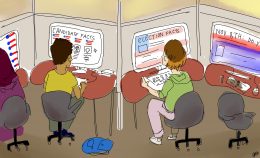
For the past year, unrelenting media coverage of the presidential election has captured our nation’s attention. We all know that next’s week vote will determine who will lead our nation for the next four years.
For many students, next Tuesday will be the first presidential election in which they are eligible to vote — unless you’re voting with an absentee ballot, in which case the deadline to mail your request form is today, Nov. 1, by 5 p.m. There is no shortage of information on the presidential candidates; chances are that you have already decided. We, as Pipe Dream’s Editorial Board, firmly believe that voting is both a privilege and a responsibility.
If you plan not to vote because you feel that you cannot affect the political process, we urge you to reconsider. This election has been exceptionally taxing and has revealed disheartening aspects of our society, but that does not mean that we should admit defeat and embrace cynicism. Voting is still a means to effect political change and attempt to maneuver the remains of the 2016 election cycle.
This being said, don’t forget that the presidential ticket is only a part of this ballot. State and local elections are also decided by Tuesday’s vote. Your vote will hold much more weight in these races — and their outcomes are just as important.
Change happens from the bottom up. National policy is affected by what happens at the state and regional level; it’s an aggregate of the decisions made by thousands of elected officials, not just one. When you go to vote on Tuesday, you’re not only voting for the president, but also your U.S. senator and representative, state senator and assembly person, county executive and county legislator.
Your local politicians are the people who make the decisions with which you are most directly engaged. Policies that affect your daily life are at the hands of these politicians.
The biggest obstacle to participation in these races is often a lack of education about the candidates. It’s a myth that it is difficult to learn about the races, and becoming an educated voter can happen in a matter of minutes, using nonpartisan online websites to quickly inform you of the candidates’ proposed policies and voting records. We strongly recommend that you take a few minutes before Election Day to prepare to cast your ballot.
Here’s how:
1. Find your polling place. If you live in New York, visit https://voterlookup.elections.state.ny.us/votersearch.aspx to find your official polling place.
2. Find out who is on your ballot. The website ballotpedia.org will give you a rundown on who is running in your districts for state and national elections. To find county candidates, you may need to find your county’s voter information website and look up a sample ballot — for Broome County residents, it’s broomevotes.com.
3. Find out your candidates’ platforms. The website ballotpedia.org also provides links to summaries of your candidate’s platforms and voting record.
It’s easy to become an informed voter, and definitely not too late. A small amount of research can go a long way in helping you have a say in the policies that affect you most.


